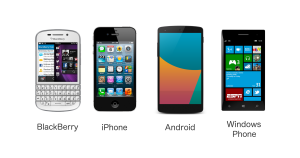WhatsApp is a popular app that I’m sure many of you have heard of, but what is it really for? It’s an application that effectively replaces a lot of the communication your phone is already capable of. WhatsApp allows you to send text messages, pictures, videos, and your location and contact info, easier, cheaper, and faster than services provided by our cellular phone providers, and with no limits on how much you can send. It does this all for free for the first year, and will continue to do this for only $.99 a year after that, and doesn’t bother you with pesky advertisements! With 450 million monthly active users, this was such a great business idea that Facebook bought the company for over $16 billion earlier this year. WhatsApp is especially popular in Europe, India, and Latin America, and it’s gaining ground in North America as well.
 Why would you want an app that can do things that your phone already does for you? The most obvious reason is the cost. All cell phone providers charge us based on how many texts we want to send, how many pictures we send, time spent talking to other people, and how much data we use. WhatsApp charges you only once a year, and the cost is absolutely negligible! Instead of paying $10 a month for unlimited text messages, you can spend $1 a year, and get the same thing. All WhatsApp requires is an internet connection. You can use a Wi-Fi connection, or a 3G connection. If you use a lot of data without a Wi-Fi connection, you may have to pay more to your cell provider for unlimited data access.
Why would you want an app that can do things that your phone already does for you? The most obvious reason is the cost. All cell phone providers charge us based on how many texts we want to send, how many pictures we send, time spent talking to other people, and how much data we use. WhatsApp charges you only once a year, and the cost is absolutely negligible! Instead of paying $10 a month for unlimited text messages, you can spend $1 a year, and get the same thing. All WhatsApp requires is an internet connection. You can use a Wi-Fi connection, or a 3G connection. If you use a lot of data without a Wi-Fi connection, you may have to pay more to your cell provider for unlimited data access.
The best thing about WhatsApp is that it works on and between all popular cell phone platforms. Unlike services such as Blackberry Messenger, you can instantly chat with friends on Android, iOS, WindowsPhone, Blackberry, and even more obscure platforms like Symbian!
 As great as this all sounds, there are downsides to WhatsApp as well. The most pressing concern is that in using WhatsApp to send messages, our data isn’t necessarily secure. WhatsApp claims that they don’t store messages or pictures on their server, but they have been investigated in Canada for supposedly intercepting messages. Depending on your level of desired privacy, giving another company access to your personal data may be a major downside. Another disadvantage is that using WhatsApp requires other people you want to communicate with to also use WhatsApp. None of the amazing features – unlimited text messaging, unlimited picture messages, etc. – are available to you if you’re trying to communicate with someone who doesn’t have WhatsApp.
As great as this all sounds, there are downsides to WhatsApp as well. The most pressing concern is that in using WhatsApp to send messages, our data isn’t necessarily secure. WhatsApp claims that they don’t store messages or pictures on their server, but they have been investigated in Canada for supposedly intercepting messages. Depending on your level of desired privacy, giving another company access to your personal data may be a major downside. Another disadvantage is that using WhatsApp requires other people you want to communicate with to also use WhatsApp. None of the amazing features – unlimited text messaging, unlimited picture messages, etc. – are available to you if you’re trying to communicate with someone who doesn’t have WhatsApp.
While not really a disadvantage, it’s important to note that WhatsApp doesn’t provide free calling. Any calling features in the app uses up the minutes you have to pay for through your cell provider. Also, if you leave the province or country, roaming charges may apply to you if you’re accessing WhatsApp services through a 3G connection. The good news is, you can still use WhatsApp as normal if you have a Wi-Fi connection!
There are alternative services similar to WhatsApp as well. Kik is another very popular messaging service available for all popular smart phone platforms. There’s also the previously mentioned BBM for Blackberry users. Skype is another service available for most smart phones, which also provides video calling, as well as messaging services. Unfortunately, all these services, WhatsApp included, only work within their own ecosystems, and not with each other.
Jenna Hartley is a software development intern at Push Interactions, learning about iOS and Android development.
Sources
